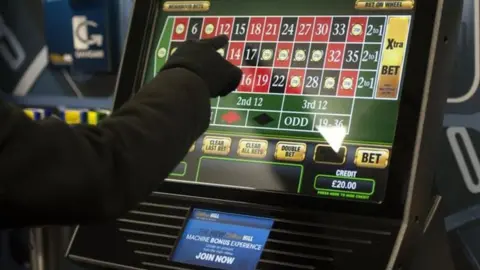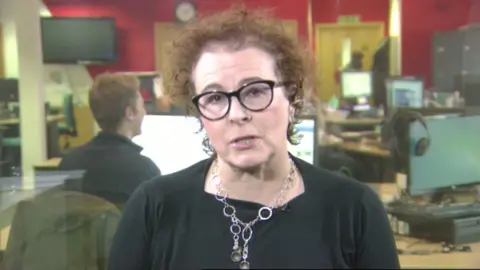Number of child gamblers quadruples in just two years
 PA
PAThe number of children classed as having a gambling problem has quadrupled to more than 50,000 in just two years, a report has claimed.
The Gambling Commission study suggests that 450,000 children aged 11 to 16 bet regularly, more than those who have taken drugs, smoked or drunk alcohol.
Bets with friends, slot machines, and scratchcards, were most popular.
A campaigner on the issue, Bishop of St Albans Right Reverend Alan Smith, called it a "generational scandal".
"Today's findings by the Gambling Commission makes worrying reading and serves as a warning to parents," he said.
- Over the past 12 months, 39% of 11-16 year olds have spent their own money on gambling and 14% in the previous week
- Young people who have gambled in the past week spent an average of £16
- 6% had gambled online using a parent or guardian's account
- 60% of young people think their parents would prefer them not to gamble at all, however only 19% said their parents set strict rules about gambling
Some admitted using betting shops or online gambling sites despite them being illegal for under-18s
The analysis also suggests one in seven boys followed betting brands on social media.
The commission also raised concerns that close to a million young people had been exposed to gambling through "loot boxes" in video games or on smartphone apps.
These can involve a player paying money for an item that is only revealed after purchasing.

The report was based on an Ipsos Mori study of 2,865 11 to 16-year-olds carried out between February and July.
It comes amid increasing worries about gambling, especially fixed-odds betting machines and the number of betting ads during the showing of sport on television.
Lunch hour betting
Last week, a Gambling Commission report said that only 10% of pubs intervene to stop children gambling on their premises.
Liz Ritchie's son was a gambling addict who took his own life a year ago this week, aged 24.
She told the BBC she blamed government deregulation of the betting industry for allowing the growth of, for example, fixed odds betting machines, dubbed the crack cocaine of the industry.
"It was because of deregulation that these machines came on the High Street so that Jack and his friends were able to gamble in their lunch hour," she told the Victoria Derbyshire programme.
She blamed advertising for helping to normalise gambling among the young, and urged the government to ban it. At the moment, she said, it was being left to parents and teachers to teach about the dangers of betting.
'Out of sight'
Gambling Commission executive director Tim Miller called for a "joined-up approach" to keep children safe.
"There's no doubt that today's figures on children and gambling should make people sit up and listen," he said.
"But while discussions about children gambling might conjure up images of kids sneaking into bookies or sitting alone on their iPad gambling on an online casino, our latest research paints a more complex picture.
"The most common activities that children gamble on are not licensed casinos, bingo providers or bookies.
"Instead we found children preferred to gamble in informal environments, out of sight of regulation - private bets between friends or playing cards with their mates for money."
